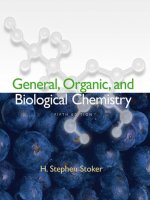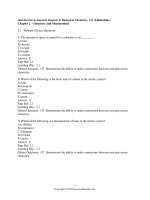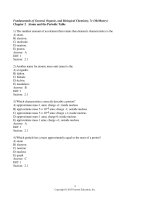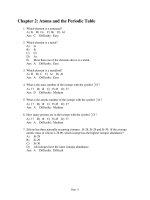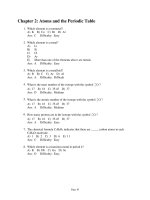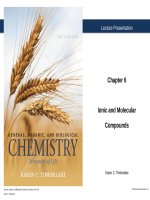Laboratory manual for general organic and biological chemistry 1st edition by todd deal solution manual
Bạn đang xem bản rút gọn của tài liệu. Xem và tải ngay bản đầy đủ của tài liệu tại đây (227.65 KB, 5 trang )
Laboratory Manual for General, Organic, and Biological Chemistry 1st
edition by Todd Deal Solution Manual
Link full download: />
Lab 1: Why is Safety So Important in Chemistry Lab?
Materials and Equipment
1. Watch glasses (may need to provide extra)
2. Table sugar – sucrose
3. Cotton cloth squares – approximately 2” x 2”
4. Egg whites
5. Styrofoam packing peanuts
6. Concentrated sulfuric acid, H2SO4 (18 M)
7. Sodium hydroxide solution, NaOH solution – 6 M
8. Acetone in wash bottles
9. Concentrated Hydrochloric acid, HCl (12 M)
10. Concentrated Nitric acid, HNO3 (16 M)
Notes
The experiments in this lab may be conducted as demonstrations. However, students enjoy
doing the reactions themselves. Giving them the opportunity to handle these potentially
dangerous chemicals helps them to learn to respect the chemicals without being afraid of
them. Fear in the laboratory is a significantly negative and potentially dangerous emotion.
Answers to Pre-Lab Questions
There are at least 10 violations in the drawing. Here is a list of 10 representative items:
Student is not wearing safety glasses
Student is wearing open-toed shoes
Crumpled up paper on the lab bench
Personal item (book bag) in the work space
Label on sulfuric acid is torn and difficult to read
Chain on safety shower is broken and too short to reach
Flammable substance on bench near Bunsen burner
Stopper left off of reagent bottle
Soda can on lab bench
Eyewash station is inaccessible
Answers to Questions
1.a. Immediately remove the affected clothing.
b. Immediately remove the affected clothing and rinse the affected area with water for
a minimum of 10 minutes.
2. Both chemicals are corrosive and will harm skin as indicated by the fact that the appearance
of the egg white protein was changed by both compounds.
3.a. Many cell phones/covers have plastic in their construction, mechanical pencils, pens, book
bags may contain plastics in fabrics or covers, calculators often have plastic cases, etc.
b. When possible store them in areas away from the lab bench; otherwise, keep them
away from solvents and other chemicals.
c. Do all calculations away from the area on the lab bench where the solvents were used.
4. The remaining material is carbon. C12H22O11 – 11 H2O’s = only C left.
Lab 2:
How Will I Use Math and Measurement in My Career?
Answers to Pre-Lab Questions
1. a. 0.390 g – 3 significant figures
b. 5.04 cm – 3 significant figures
c. 0.0612 mL – 3 significant figures
d. 20,000 lb – 1 significant figure
e. 407.0 L – 4 significant figures
f. 0.81070 m – 5 significant figures
2. a. 12.7
b. 23
c. 96,634
d. 0.315
3. a. 100 mg/5 mL
b. 5 mL/100 mg x 200 mg = 10 mL
4. Figure on the left: high precision/low accuracy
Figure in the center: low precision/low accuracy
Figure on the right: high accuracy/high precision
Answers to Practice with Conversion Factors and Problem Solving from Report Sheet
1. a. 210 g
b. 5 Tbsp
c. 45 cm
d. 11 yd
e. 0.150 L
f. 0.75 tons
2. a. 10 mg
b. 16 cups
c. 120 ounces, 21 inches
d. 5 dL
3. (Significant figures are not strictly taken into account in the following answers. Left to
instructor discretion in regards to number and relevance of sig figs in a conversion factor.)
a. 236.5 mL
b. 3.4 kg, 53.34 cm
c. 11 lbs
d. 1.183 L
4. a. 3.11 miles
b. 1.86 miles
c. The question is asking that students use the “translator” for length in Table 2.5, 1 inch =
2.54 cm. A possible solution:
1 mile x 5280 ft/1 mile x 12 inches/1ft x 2.54 cm/1 inch x 1 m/100 cm x 1 km/1000 m
5. A possible conversion using the info in the designated tables:
5 mL x 1.0 L/1000 mL x 1.057 qt/1.0 L x 2 pt/1 qt x 2 cup/1 pt x 4 Tbsp/0.25 cup x 3 tsp/1
Tbsp = 1.01 tsp
Thus, the label is correct.
6. 325 mg – significant figures left to instructor
7. 91.44 m – significant figures left to instructor
8. a. 300 mg
b. 3 mL
Lab 3:
